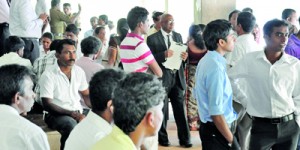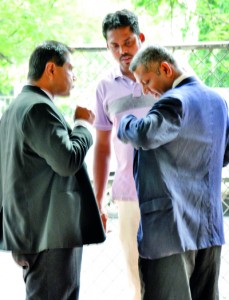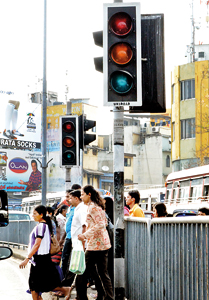Sri Lanka’s jaywalkers taken to task in Traffic Court
 Sri Lanka’s pedestrians will now have to watch their step as the traffic police of Colombo city and suburban areas has been implementing a drive against jay-walkers to bring a semblance of sanity to the traffic on the city’s roads. But the manner in whic they were caught and produced before the Colombo Traffic Court and the agony they had to undergo at the court room for over four hours to pay the Rs.1000-Rs. 3500 fine for the offence was unbearable, many offenders complained.
Sri Lanka’s pedestrians will now have to watch their step as the traffic police of Colombo city and suburban areas has been implementing a drive against jay-walkers to bring a semblance of sanity to the traffic on the city’s roads. But the manner in whic they were caught and produced before the Colombo Traffic Court and the agony they had to undergo at the court room for over four hours to pay the Rs.1000-Rs. 3500 fine for the offence was unbearable, many offenders complained.
Traffic Administration and Road Safety Director Senior Superintendent of Police (SSP) K. Arasaratnam said that the Police began strictly implementing the law regarding jaywalkers especially in Colombo and other main cities, from July this year.
He revealed that 3,631 people have been produced before the Colombo Traffic Court and imposed fines amounting to over Rs. 3.6 million up to September this year.
“The related law in the Motor Traffic Act, initiated in 1987 – Number 444/18- states that a pedestrian should cross the road using the  pedestrian crossing or when there is a pedestrian crossing within a 50 metre distance from where a pedestrian intends to cross the road inclusive of sub ways and flyovers,” he added. “Those who violate this law would be taken to the Traffic Courts and following a brief hearing they would be fined Rs 1000 in the first instance, Rs 2000 for the second occasion and Rs 3500 for the consecutive third offence” he said adding that the City Traffic Police is conducting awareness campaigns to educate the public on road traffic regulations. He disclosed that Colombo, Borella, Maradana, Fort, Kollupitiya and Bambalapitiya are places where pedestrians constantly violate the law when crossing the road.
pedestrian crossing or when there is a pedestrian crossing within a 50 metre distance from where a pedestrian intends to cross the road inclusive of sub ways and flyovers,” he added. “Those who violate this law would be taken to the Traffic Courts and following a brief hearing they would be fined Rs 1000 in the first instance, Rs 2000 for the second occasion and Rs 3500 for the consecutive third offence” he said adding that the City Traffic Police is conducting awareness campaigns to educate the public on road traffic regulations. He disclosed that Colombo, Borella, Maradana, Fort, Kollupitiya and Bambalapitiya are places where pedestrians constantly violate the law when crossing the road.
Ordinary citizens with a mix of confusion and surprise on the road were highly critical against the action to take offenders to courts for violating the pedestrian crossing rule, claiming that they were not aware such rules actually exist. “It is not fair that all of a sudden the police pounced on people who crossed the road outside the zebra crossing ordering the people to appear before the Magistrate Court”, K. Priyaratne who is a resident of Minneriya told the Business Times at the court premises on Monday. He said that he came to Colombo last week for an official matter and he was caught by the police at Union Place for crossing the road at a wrong point. “How do they expect me to act according to the rule?” he asked. I have no idea whatsoever about it,” he said. He said that he had to spend around Rs.2000 to come to Colombo again to pay Rs. 1000 as a fine wasting his time for two days. “Is it fair for rural folk like me to be punished in this cruel manner?” he asked with tears in his eyes.
If the police impose a spot fine, then it was not a problem for him as he had committed a road traffic offence, he added.
W.K. Piyadasa, a private bus driver, told the Business Times that he was caught by the police at Armour Street Colombo when he crossed the road to fill a bottle with water from the nearby tap.
He said that he is losing his day’s pay in addition to Rs.1000 fine which means that his family has to starve during the whole day.
This powerful government can amend the law enabling the police to impose on the spot fine without pushing poor people into difficulty by ordering them to appear before court to pay a fine, he added.

Jaywalkers in court
“We face much difficulty due to the implementation of this rule. Earlier we simply crossed the road in front of our office to get the bus, now we have to walk some metres to reach a pedestrian crossing,” said Sumana Perera, who works in a Keells Super market in Colombo. Wasting time at the court is unbearable, she said, adding that they were treated like criminals for simply violating a pedestrian crossing rule. At least 250 people who came from distant areas like Thirippane, Trincomalee, Kandy, Matugama, Padaviya and suburban areas of Colombo were present at the Colombo Magistrate Court last Monday to face charges of not using pedestrian crossings and haphazardly crossing the highways and city roads in the capital Colombo.
Before the commencement of court proceedings they were asked to wait in a long queue to obtain the case number from a policeman who was on duty.
Then a policeman ordered them to wait outside the court room till the completion of hearing of other motor traffic cases.

Jaywalkers in court
A police constable at the entrance of the court room warned the offenders that they will have to wait at least till 5 pm due to the large number of cases to be disposed of by the Magistrate and those who want to take up their case early should seek the assistance of a lawyer. He was addressing them outside the court room, openly appearing to canvass cases for lawyers.
Around six lawyers were then seen trying to offer their services for a payment ranging from Rs.200 to Rs.500. However with or without the assistance of lawyers everybody had to pay the fine of Rs.1000 following the Magistrate’s order. Offenders had to wait inside the court cell till their names were called by a police officer to pay the fine. Only a court clerk was at the desk to collect money and issue a receipt to offenders who were waiting many restless hours in the court cell to pay the fine.
Anyone who has undergone this experience will never (again) violate the pedestrian crossing rule, Nihal Sarathchandra, a junior executive working in a private firm, said.
Follow @timesonlinelk
comments powered by Disqus





















